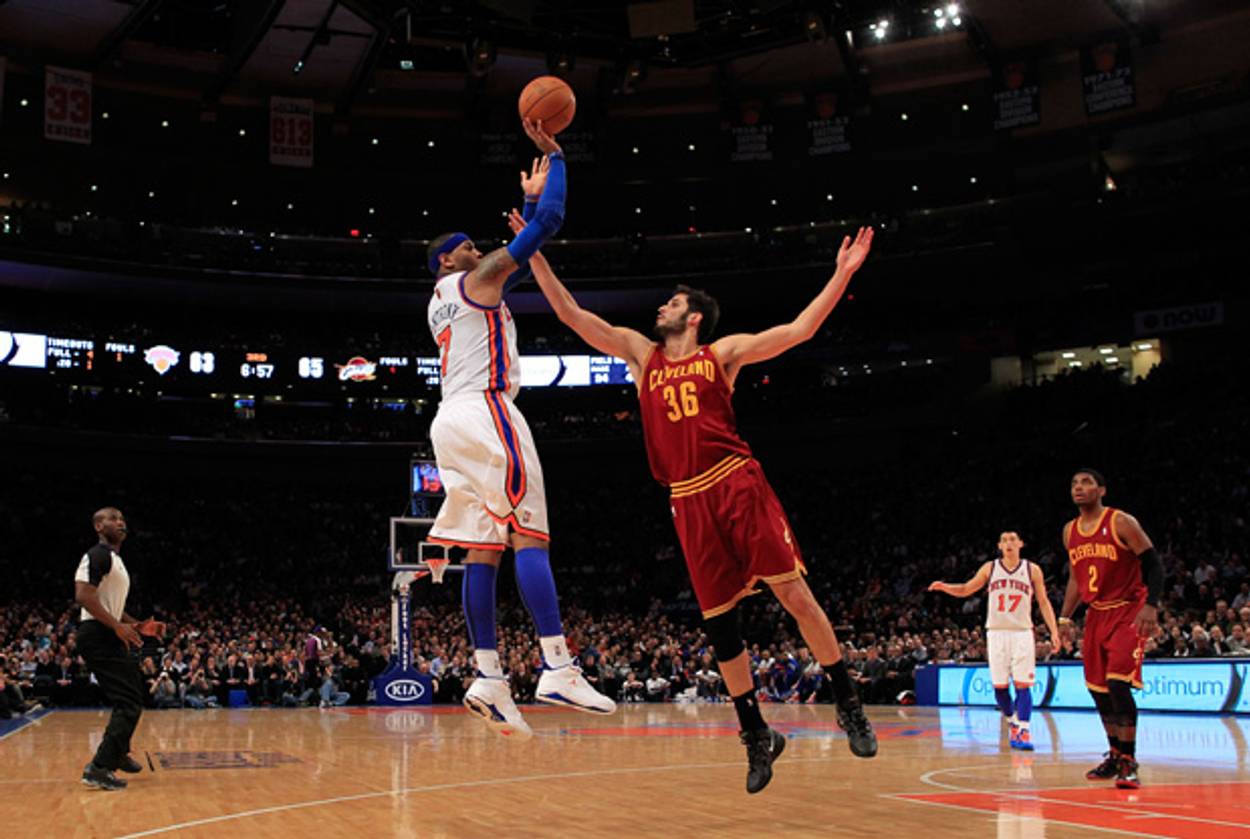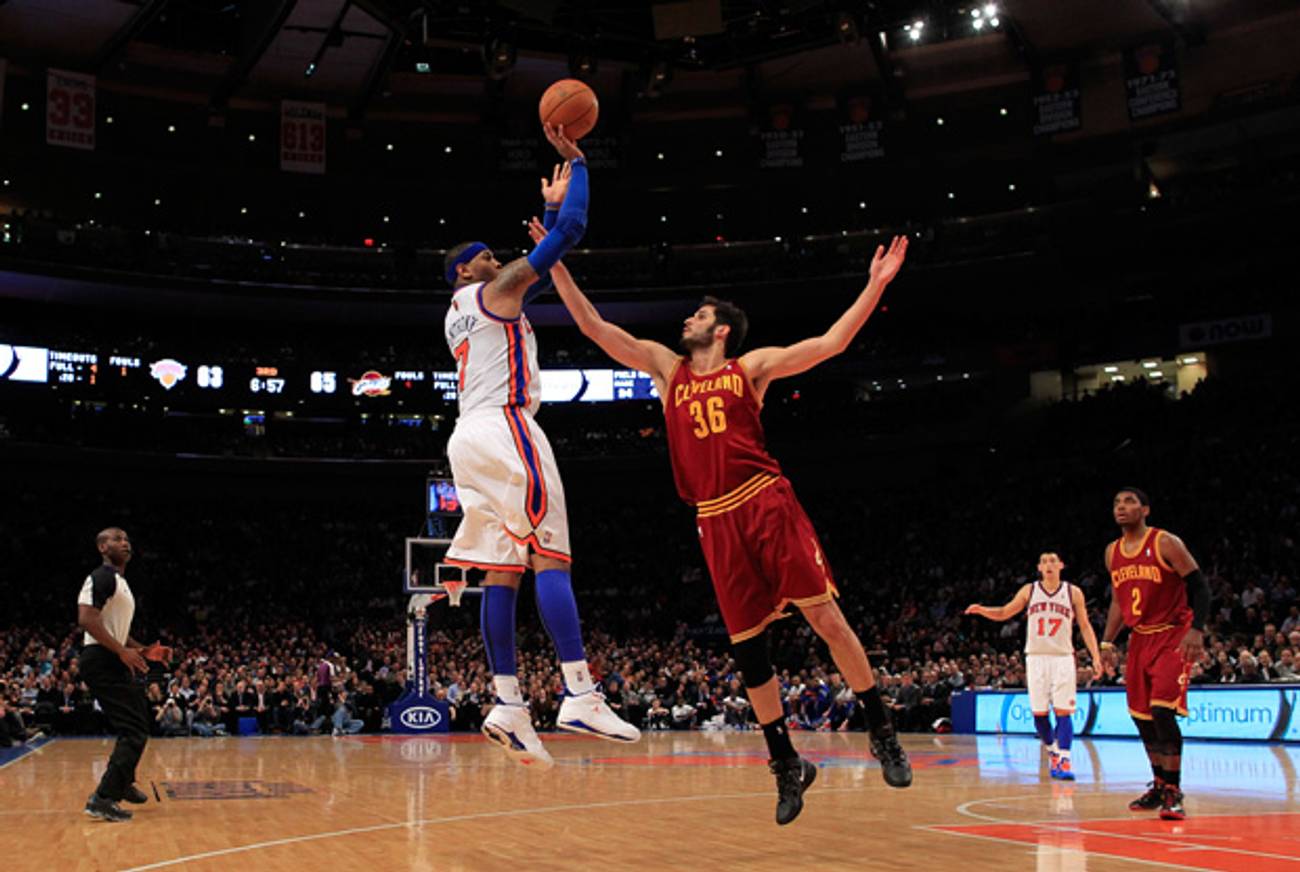Casspi at the Garden
The Jewish Jeremy Lin? Not quite.




Omri Casspi, the first and so far only Israeli to play in the NBA, had an average night last night in his Cleveland Cavaliers’ 103-120 loss against Jeremy Lin’s New York Knicks at Madison Square Garden. Unlike during his first two years, in which, off the bench, he alternately flashed promised and struggled with the Sacramento Kings, Casspi started, as he has all of the Cavs’ 33 games. He’s averaged 22.8 minutes per game this season; last night, he played 20. He’s averaged 7.7 points; he scored five. 1.4 assists per game; one last night. 3.4 rebounds per game; seven last night. He defended Carmelo Anthony as ably as an ordinary pro basketball player could be expected to defend one of the league’s best players.
In the Garden’s rafters, it has been noted, hangs the legendary Coach Red Holzman’s banner with the number of regular-season wins he achieved as Knicks head coach: 613. Casspi wears number 36—double chai.
All as expected. Yet at the end of the night, I found myself rethinking Casspi, and not only because he was the best Jew on the floor—although given Amar’e Stoudemire’s anemic 4-for-11 from the field, stupid technical foul, and generally frustrated play, he most certainly was.
This was the third time I’ve seen Casspi play, but the first time it wasn’t a pre-designated Jewish Heritage Night and the first time at the Garden. And not just the Garden, but a sold-out, hyped-up, Linsane Garden crowd. Carlos & Gabby’s, the ostensibly Tex-Mex Glatt Kosher stand that also serves pastrami knishes (I did not try one, as Tablet Magazine does not offer hazard pay), had a huge line at halftime, and most men in it wore kippot, but most also wore Knicks paraphernalia. The kashrut supervisor told me the evening was no busier than any other for the stand. When I saw Casspi play the New Jersey Nets in the Meadowlands two years ago on a Jewish Heritage Night, they put in an extra kosher concession stand, and the half-filled arena went bonkers every time Casspi touched the ball. When Casspi hit a three in the first quarter last night after Lin slipped on his way from the key and he got an open look, the spectators did nothing—the Knicks were down, and now they were down by more.
The Cavs jumped to an early lead and an overall dominant first half, partly on the strength of Jersey-born, Duke-bred, lightning-fast rookie point guard Kyrie Irving. At one point the Cavs were up 50-36, and they led 61-49 at the half. The Knicks’ defense was non-existent. But then in the second half, the home team started hustling, and the crowd got into it, and Lin got everyone involved—he had a double-double, 19 points and 13 assists—and Steve Novak got extremely hot (five 3s!), and by the fourth quarter it was clear the Knicks were going to win, which they did, making them 10-3 in the Jeremy Lin Era. Sunday afternoon, they will have the chance to go above .500 for the first time this season. You would have thought it was a playoff game judging by the Knicks’ and especially the crowd’s intensity in the third quarter.
I wonder if the Cavs have figured out how to use Casspi properly. On most offensive possessions, he sat on the wing, barely moving; sometimes he’d get a touch, sometimes he wouldn’t. He is starter who plays fewer than half his team’s minutes. Like many non-American players, he is tall (6’9”) and a forward but effective from behind the three-point arc. On defense, he is a bit sloppy getting back to his man after playing help. In the third quarter, he almost stripped Lin and began a fast break down the court, but he was called for a foul instead. Slowing up and losing control of the suddenly dead ball, he kicked it up and again to get control of it: the unmistakable mark of someone who grew up playing soccer.
After the game, in the locker room, Casspi looked spiffy in a gray three-piece suit but wore a sour look on his face. Acknowledging he had a few minutes, he distractedly checked his iPhone as I introduced myself. His face did light up—genuinely, spontaneously, undeniably lit up—when I asked him my first question, about meeting, as was indicated on his Twitter feed, Gilad Shalit. Casspi said they met in Orlando, Florida, during All-Star Weekend, and that, yes, Shalit is primarily a fan of Casspi’s old team, Maccabi Tel Aviv. He half-said a boilerplate answer to my dumb question about Cleveland being a supportive city and the Cavaliers being a good organization, and then turned the conversation to what he wanted to talk about: his team’s shitty performance in the second half, which cost them the game. I remember he was similarly upset when the Kings lost to the Nets, and me being similarly flummoxed: he plays for a crappy team and loses on the road, and he’s anguished?
Then it was onto the most obvious question of all: Lin. Asian-Americans (as well as actual Chinese and Taiwanese people) have been captivated by the success of this classic example of one of their own. I have witnessed American Jews—ones far more religious than Casspi by the way—behave in a similar manner about Casspi. Is there any resonance? Casspi had nothing. He mumbled something about there being lots more Asians in the world than Jews. I’m not having much of it, either: not until Casspi is much better, and not until he stands for something larger in the zeitgeist rather than what he is, a physical specimen from a basketball-mad first-world country who—guess what?—plays basketball pretty well.
I think it’s time we re-evaluate Casspi—re-evaluate what it means to be the first and so far only Israeli to play in the NBA. Casspi is probably not the best Israeli basketball player of all time; actually, his Israeli Basketball League stats are fairly pedestrian. He’s not one of the top 50 Jewish basketball players of all time, and will be only if he fulfills his potential to the max. His stature as the first Israeli in the NBA is an indication of, sure, talent (and also brute height), but also of willpower and of personality. He could be a contributor on Maccabi, the Yankees of the IBL—he was all set to re-join in January had the NBA lockout not come to an end, but he himself could make this decision even now. He could have been home when Shalit was freed, obviously a joyous event for him. He could be near the beach, not walking out into a rainy, cold, depressing city—only to know that home is Cleveland. Surely he could make a good deal of money. But instead he chooses to be a journeyman in the NBA for a second not-very-good team that may also not know how to use him properly, and he does it for the same reason he gets upset that his 13-20 team loses to Carmelo Anthony’s team on the road: he’s a true competitor.
Related: Magic Number [Tablet Magazine]
Earlier: It’s Not Easy Being Casspi
Marc Tracy is a staff writer at The New Republic, and was previously a staff writer at Tablet. He tweets @marcatracy.